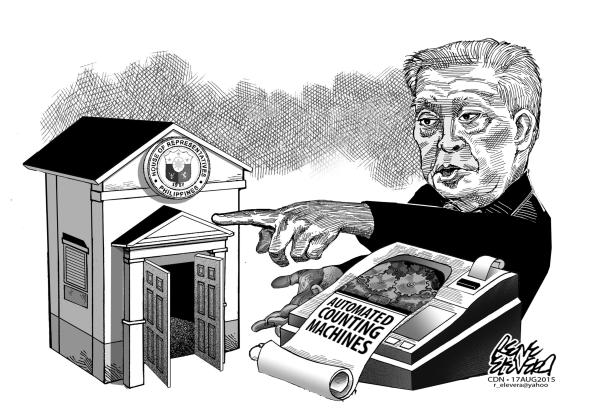If there’s anyone who is to blame for the Commission on Elections’ (Comelec) “forced lease” of more than 93,000 optical mark reader (OMR) machines to be used in next year’s elections, it is first and foremost Congress.
A cursory examination of the timeline leading to Comelec’s awarding of the lease contract with option to purchase to Smartmatic-Total Information Management (TIM) Corp. showed that it was Congress that hemmed and hawed through its budget deliberations as it determined whether it was to the country’s best interest to purchase the automated counting machines that were used successfully in the 2010 and 2013 elections or buy a new set of automated vote counting machines.
As Smartmatic pointed out in a statement issued in response to Comelec Commissioner Ma. Rowena Amelia Guanzon, it had recommended the refurbishment of the machines as early as 2013, right after the elections.
Guanzon issued a separate opinion after voting for the lease contract, stating that Smartmatic forced Comelec to agree with the lease contract with option to purchase after the company withdrew along with another bidder from the second bidding, citing Comelec’s tight deadline for the refurbishment of the existing precinct count optical scan (PCOS) machines.
But what drove Comelec towards its tight deadline were the delays in Congress and the continued push by interest groups like those led by former Comelec commissioner Gus Lagman for a hybrid election system that would combine manual counting of votes with automated transmission of results.
In agreeing on the contract, Guanzon cited Comelec’s mandate to ensure honest, equitable, transparent and quick elections next year.
In the 2010 and 2013 elections when the PCOS machines by Smartmatic were used, Comelec faced a boatload of cases filed by candidates who claimed to have been cheated by the new system.
Repairing the existing machines would have been cheaper and convenient, Guanzon said and the biddings were intended to find other firms that can repair the existing units more cheaply.
Comelec should have known that as a business, Smartmatic isn’t about to allow competitors access to their machines, and this is the point of Guanzon’s opinion.
But again, if Comelec managed to compel Congress, a monolithic power structure comprised mostly of the country’s political, social and economic elite, to allow them to bid for either the refurbishment or the purchase of new, more reliable automated vote-counting machines, then they wouldn’t have been in the situation they find themselves in.
For now, we can only hope the existing machines would prove to be reliable enough to get the job done.
Disclaimer: The comments uploaded on this site do not necessarily represent or reflect the views of management and owner of Cebudailynews. We reserve the right to exclude comments that we deem to be inconsistent with our editorial standards.

